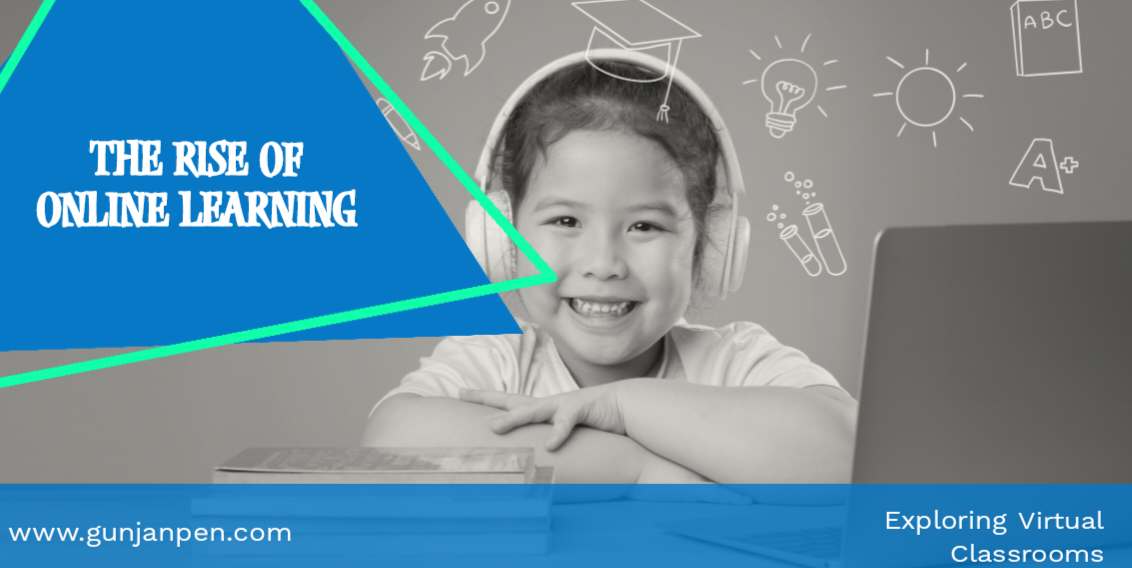The Rise of Online Learning: Exploring Virtual Classrooms -In recent years, the educational landscape has undergone a significant transformation with the emergence of online learning platforms and virtual classrooms. The rise of online learning has revolutionized the way we acquire knowledge, breaking down barriers of time and space. In this article, we will delve into the fascinating world of virtual classrooms and explore how they are shaping the future of education.
Table of Contents
- Introduction
- The Evolution of Education
- Advantages of Online Learning
- Interactive Learning in Virtual Classrooms
- Overcoming Challenges Through Technology
- Empowering a Diverse Student Body
- The Role of Educators in Virtual Classrooms
- Personalized Learning Journeys
- Skills for the Digital Age
- Online Learning Tools and Platforms
- A Glimpse into the Future
- Conclusion
- FAQs
Introduction
Online learning has surged in popularity, offering learners an innovative way to access educational content. With the advancement of technology, traditional brick-and-mortar classrooms are no longer the sole option for acquiring knowledge. Virtual classrooms, supported by robust digital platforms, have enabled students to engage in learning experiences from the comfort of their homes.
The Evolution of Education
The concept of online learning is rooted in distance education, which traces back to correspondence courses. However, the modern online learning landscape has evolved into a dynamic and interactive experience, incorporating multimedia elements, live sessions, and peer collaboration.

Advantages of Online Learning
The rise of online learning brings forth a multitude of benefits. Learners can enjoy flexible schedules, allowing them to balance education with work and other commitments. Additionally, access to a global network of educators and students fosters cross-cultural interactions and diverse perspectives.
Interactive Learning in Virtual Classrooms
Virtual classrooms are designed to facilitate active engagement. Through live video lectures, real-time discussions, and interactive quizzes, students can actively participate in the learning process. This approach encourages critical thinking and problem-solving skills.
Overcoming Challenges Through Technology
Online learning has addressed challenges such as geographical constraints and lack of resources. With just an internet connection, learners can access high-quality educational content and connect with experts worldwide.
SVV Study Material: Empowering Education with Shree Vasishtha Vidhyalaya-2023
Empowering a Diverse Student Body
Virtual classrooms have opened doors for learners who may have otherwise faced barriers to education. People from different backgrounds, abilities, and locations can now pursue their educational aspirations without significant hindrances.
The Role of Educators in Virtual Classrooms
Educators play a pivotal role in designing effective online learning experiences. They act as facilitators, guiding students through the curriculum, providing feedback, and creating a supportive virtual learning environment.
Personalized Learning Journeys
One of the remarkable features of online learning is personalized learning paths. Adaptive technologies analyze individual progress and provide tailored content, ensuring that each student’s learning journey is unique and optimized for their needs.
Skills for the Digital Age
Online learning equips learners with digital literacy and tech-savviness, crucial skills in today’s rapidly evolving world. Navigating digital platforms and collaborating virtually are essential abilities that extend beyond the realm of education.
Online Learning Tools and Platforms
A plethora of online learning tools and platforms have emerged, catering to various subjects and learning styles. From video tutorials to gamified lessons, learners have access to a wide range of resources to enhance their understanding.
A Glimpse into the Future
As technology continues to advance, the future of online learning holds exciting possibilities. Virtual reality, artificial intelligence, and augmented reality are poised to further elevate the virtual classroom experience, creating immersive and engaging educational environments.
READ MORE: PS5 PRO: Lunch Date, Price, and Specs Leaked – All You Need to Know!
Conclusion
The rise of online learning has democratized education, enabling learners from all walks of life to access high-quality content and collaborate with a global community. Virtual classrooms offer flexibility, interactivity, and inclusivity, redefining how we learn and engage with knowledge.
FAQs
- Is online learning as effective as traditional classroom learning? Online learning can be just as effective, if not more so, when designed and facilitated well. It offers unique advantages such as flexibility and personalized learning.
- Can I earn recognized certifications through online courses? Yes, many reputable institutions offer online courses that lead to recognized certifications and degrees.
- How do virtual classrooms promote student interaction? Virtual classrooms encourage interaction through live discussions, group projects, and collaborative assignments.
- Are there any limitations to online learning? While online learning has many benefits, it may require self-discipline and time management skills. It may also lack the in-person social interactions of traditional classrooms.
- What role do instructors play in online learning? Instructors guide and support online learners, facilitating discussions, providing feedback, and ensuring a positive learning experience.
